- Home
- Christine Rimmer
Marriage By Necessity Page 10
Marriage By Necessity Read online
Page 10
“I’ve had mine.”
“Then come watch me eat.”
“Nate?”
He zipped up his pants, then lifted an eyebrow at her.
“Could I borrow another pair of sweats, maybe, and a shirt?”
“Sure.” He gestured at the bureau. “Help yourself.” He pulled on his shirt. Then he watched as she jumped from the bed, found some sweats, put them on and tied the drawstring, her pretty breasts bouncing temptingly as she moved. Damn, she was beautiful. It seemed to him that she got softer and riper looking every time he looked at her. “Meggie?”
“Um?”
“Where are your own clothes?”
She looked up, blinked and pushed her hair away from her face. Then she turned to the bureau again and opened another drawer. “Dolores has all my things.” She took out a T-shirt and pulled it over her head. “The laundry, remember?” She flipped her hair free at the neck.
“Everything you brought with you was dirty already?”
“Well. Yes. I didn’t bring much. I...hate checking my suitcase at the airport. I’m afraid they’ll lose it. And besides, I thought while I was here I might pick up a few things. I’ll have to cart them back with me, but I could use some new clothes.”
Her explanation made perfect sense. And he had no idea why he’d made such a big deal out of it, anyway. “Whatever. Now, are you ready? I’m starving.”
She beamed at him. “Lead the way.”
Meggie went to see Mr. Leverson the next day. He was conscious. The nurses told her before she went into his room that he would be released in a day or two.
He smiled at her through his bandages and asked her to call him by his first name, which was Hector. “Thank you, young lady. You saved my life.”
Meggie took his thin, bruised hand.
“My home is destroyed, isn’t it?” He sounded as if he might cry.
Meggie hastened to reassure him. “No. No, really. It’s pretty messed up, but nothing a new sofa, some lamps and a little paint won’t fix.”
“I have no family,” Hector confessed in a whisper. “My wife died ten years ago. And we were childless. But I have good insurance—I’ve been careful about that. I wonder...” His voice trailed off.
“What? Come on. Tell me, please.”
“It’s too much to ask.”
“No. It’s not. Come on. Ask me.”
“Well, I’d like to get my insurance company moving on this. But from the hospital, it’s a little difficult.”
“Would you like me to call them? Dolores and I could show them the damage to your apartment.”
“Oh. Would you?”
Meggie smiled. “I’d be glad to.”
Nate called her a pushover when she got home. But when Hector’s insurance company gave her the runaround, Nate took the phone and bullied the insurance agent until the man agreed to send someone over that afternoon.
The agent showed up right at five. Dolores and Meggie worked on him together, leading him through the trashed apartment, bemoaning the pain poor Hector had suffered.
Before he left, the agent promised that all Hector needed to do was send him the receipts for the cost of the repairs. On Saturday, Meggie, Nate and Benny cleaned the place up and painted the living room and kitchen. The intruder had never entered the single bedroom or the bath, so they remained intact. By Saturday evening, the apartment looked fresh and new. The living room lacked furniture, but Hector could handle that problem himself, with the money from his insurance company.
Hector returned home on Monday morning. Dolores and Meggie took the blue Volvo to get him. When they helped him inside and he saw what his landlady and neighbors had done, he sat down on the one chair left at his table and cried. Dolores clucked over him and told him not to upset himself, that they had all been happy to help out.
He wanted to get out his checkbook right then. Dolores reassured him that they could settle up later.
“Money isn’t enough anyway,” Hector protested. “What else can I do to repay you?”
“Come to the Community Watch meeting tonight,” Meggie replied. “At my apartment, next door.”
Amos Abel, the volunteer counselor from Community Watch, came to speak to the tenants of Nate’s building at seven that night. Everyone in the building showed up, as well as four people from the building where Hector lived. Hector came, too, his face still bandaged, his left leg so stiff that Benny had to help him up the stairs.
Meggie and Dolores provided coffee and cookies. Amos Abel passed around brochures that explained the steps to a safe neighborhood. He advised them to tell each other their schedules, to learn each other’s routines and to try to have one person in each building keeping an eye out at all times.
“I know, I know,” Mr. Abel said. “You have to sleep sometimes. But do your best. Be aware. There is no substitute for vigilance.” He gestured around the room. “And this—all of you here together, getting to know each other—is the first and most important step. People who know each other look out for each other. They take action when something seems strange in a neighbor’s apartment.” He advised the tenants on the ground floor to consider barring their windows. “I realize some of you just don’t want to live that way. But you must understand that an unbarred ground-floor window is virtually impossible to truly secure.”
Before he left, Amos gave them all Community Watch stickers to put on their doors and in their windows, explaining, “The idea is to let the bad guys know that this is a place where people look out for each other.” He also gave Dolores signs to put up in front of the buildings. The tenants agreed to meet again on Thursday, to exchange schedules.
Meggie felt pretty good by the time they all returned to their own apartments. She dared to hope that maybe, working together, they could protect themselves against predators like the one who had attacked Hector.
“Proud of yourself, aren’t you?” Nate teased, after the meeting, when they lay together in bed.
With a small, abashed groan, she snuggled in closer to him.
“Oh, now you’re going modest on me.” He started to tickle her.
She laughed and squirmed and batted his hands away. And then he kissed her. She kept on squirming, but for an entirely different reason—and she stopped trying to push him away.
Later, while Nate slept, Meggie lay wide-awake. The inner glow she’d felt at helping Nate’s neighbors had somehow turned to a guilty heat down deep inside her.
She had come here to L.A. for one reason: to tell Nate face-to-face about the baby.
But instead, she had only lied some more. And Nate, whose ebony eyes always saw through the cleverest deceptions, seemed totally oblivious to the lies she told—lies she would not stop telling for as long as he continued to believe them.
Meggie understood herself now. All her vows to the contrary, she would go on lying until Nate finally couldn’t help but see the truth; until her own thickening waistline at last betrayed her. She would steal every glorious moment with him, each last second that God was willing to give her.
Just a little while longer, she whispered silently to herself, here, in this place of palm trees and odd, sweet people. A little while longer. With Nate. Is it too much to ask?
Meggie knew it was too much to ask; her agreement with Nate called for her to let him go as soon as she got pregnant. But she just didn’t care. She would continue her deception with evasions and half lies. Gentle lies, she told herself. Lies that hurt no one, really. Lies that only bought her a little more precious time with Nate.
Nate left again on Wednesday, after warning Meggie that he probably wouldn’t return until the weekend. As soon as he was gone, she looked up an ob-gyn in the phone book. On Thursday morning, she went to see him. He told her she was well over three months pregnant and doing just fine. He asked for urine and blood samples, then said that the office would call her if there were any abnormalities in the tests.
Meggie knew a moment of panic. What if they called and Nate answere
d?
But then calm descended. If Nate answered, so be it. Her foolish deception couldn’t go on forever anyway. And she owed it to their baby to get decent prenatal care.
After she left the doctor’s office, Meggie went shopping, as she’d told Nate she would. She bought some underwear, T-shirts, two loose jumpers and three pairs of jeans with elastic waists, clothes that she would be able to wear through most of her pregnancy—clothes that would also help to disguise her condition for a while. As a pure indulgence, she also picked up a bottle of perfume that smelled of roses. She smiled to herself as she sniffed it on her wrist, picturing Nate kissing all her pulse points, whispering that she smelled like a rose.
She got back to the apartment at four-thirty, but all she did was drop her shopping bags inside the door. She needed to pay a quick visit to Dolores, so they could talk about the refreshments for the Community Watch meeting that night.
However, Dolores wasn’t in the mood to discuss refreshments. She opened the door with eyes red from crying. “Hola, Meggie,” she said miserably.
“Dolores. What’s wrong?”
“Come in.” She turned and left Meggie to follow after.
In the kitchen, Dolores dropped to a chair by the table in front of a tissue box and a pile of used tissues. A sob shook her plump shoulders. She ripped a tissue from the box and buried her face in it.
Meggie went straight to her and laid a comforting hand on her shoulder, which inspired Dolores to erupt from her chair and into Meggie’s bewildered arms.
“Ah, sweet virgin, oh Dios mio. Mi familia—¿dónde está? Where is my family, Megan? Todos mis niños, where have they gone?”
Meggie soothed and clucked and looked around frantically for Benny. “It’s okay. It’s all right. Settle down, now. Where’s Benny?”
Dolores moaned. “He goes. Whenever I get like this. I give him the ache in la cabeza, the head, you know?” Dolores wailed some more.
Meggie hugged her and patted her until she settled down. Then she sat her back in her chair and took the one next to her. “All right, now. What is it?”
A long, rambling, Spanish-punctuated explanation ensued. Dolores had borne her Benny five beautiful children—two sons and three daughters—all of them citizens of this great land. Between them, all those children had given Dolores and Benny eleven handsome grandchildren. Yet, out of all those children and all those grandchildren, only one—Yolie—would be home for Thanksgiving. Even Mateo, who always came, was off on the road somewhere, playing a gang leader in West Side Story.
When the sad tale had been told, Meggie sympathized some more. And then it occurred to her that they could share Thanksgiving together: Dolores, Benny and Yolanda—and Meggie and Nate. She suggested the idea to Dolores, who actually started to smile through her tears.
Then Meggie had an even better suggestion. “Wait. We could invite everyone. In the two buildings. That way no one would have to spend the holiday alone.”
Dolores declared it a brilliant idea. “A fiesta. Una celebración grande. For all the lonely ones. For everyone. ¿Sí? Yes. Wonderful!”
They had the menu half planned by the time Dolores promised to bring cookies to the meeting that night and Meggie took her leave.
Nate returned ahead of schedule, on Friday afternoon. After a lovely hour in bed, Meggie told him all the news. He groaned when he heard how several of his neighbors would be coming to his place for dinner next Thursday, but he didn’t try to change her plans.
The days that followed were happy ones. Nate took Meggie out for a little sight-seeing. They walked down Hollywood Boulevard, hand in hand, reading the names of the stars on the sidewalk, looking in the windows of the rather rundown stores, all decorated for Christmas now, in shiny red garlands and twinkling party lights. They visited the Descanso Gardens, where there were roses blooming even now, in November. They took in a movie at Mann’s Chinese. And Dolores had tickets to a Sunday matinee at the Mark Taper Forum, a new play starring one of her grandson’s friends. She and Benny didn’t feel like going, so Meggie and Nate went, instead.
On Monday, Nate spent a few hours in his office at his computer, then he went out to meet with a client. He came back with the news that he’d be leaving Tuesday.
Meggie’s heart sank. “For how long?”
He grinned. “Don’t want me to miss the big feast, huh?”
She sighed. “You’re right. I really want you here.”
“Settle down.” He came and put his arms around her. “This thing will take a day and a half, max. I have to serve some papers to a guy in Crescent City, up near the Oregon border. I know right where to find him, and he’s going nowhere from what my client told me, so I don’t even have to go looking.”
“What are you saying?”
“That I promise I’ll be back Wednesday at the latest, Tuesday night if I’m lucky. I wouldn’t miss your Thanksgiving—you know that.”
The next morning, Nate tried to get Meggie to sleep in. But she wouldn’t. She insisted on getting up with him at 4 a.m. to fix him some breakfast before he took off.
She had set the timer the night before, so the coffee was already made. Nate offered to help fix the food, but she wouldn’t hear of it. So he sat at the table, letting her wait on him, sipping caffeine and watching her bustle around in his bathrobe, whipping up eggs and toast.
He loved to watch her. He thought that she could do just about anything. She was equally at home treating cattle and baking cookies for her Community Watch meetings. She could pull on her Wranglers and eat dust in the drag during a trail drive—or put on her party duds and dance until dawn.
Even the few pounds she’d been putting on lately looked good on her. She seemed softer, rounder, sexier than ever.
Right then, she stood on tiptoe, reaching inside the cabinet above the stove to bring down the little bowl she liked to use for serving jam. Her slightly rounded belly pressed against the counter rim.
Something shifted inside Nate at that precise moment. And he saw the truth he’d been managing not to see.
Meggie was pregnant.
Chapter Eight
Meggie found the little bowl, closed the cupboard and set the bowl on the small section of counter between the stove and the refrigerator. She spooned out the jam. Then she put the jam jar away and took the bowl to the table. She looked up and smiled at Nate as she set the bowl down. “More coffee?”
He returned her smile mechanically, shaking his head. “I’m fine.”
With a tiny shrug of her shoulders, she went back to the stove to stir the eggs. The toast popped up. She buttered it, put it on a small plate and cut it into neat triangles.
Nate went on watching her, stunned. In the space of one brief second, everything had changed. She set the food before him and a smaller portion at her own place, then went about brewing herself some herbal tea.
Herbal tea. It came to him that he hadn’t seen her drink coffee in weeks—maybe months. But that made sense. Caffeine couldn’t be that good for the baby.
When the tea was ready, she carried it to the table and sat down opposite him. She took a bite of egg and looked up. Before she could ask why he wasn’t eating, he picked up his own fork and began putting eggs in his mouth. As he dutifully chewed the eggs and ate the toast, she talked about her Thanksgiving party, about who would be there and how she would seat them all.
Nate watched her mouth move, nodded at the right places and made interested noises when required.
He said nothing at all about what he’d just realized—no doubt for the same reason she hadn’t: because as soon as they got it out in the open, there would be no more reason for them to go on sleeping together, go on being together.
He had a ridiculous urge to throw back his head and laugh out loud at his own ability to deceive himself. Talk about clues....
He recalled all those menstrual periods she never seemed to have. And all the times when he would glance up to find her watching him with a strange, guilty look on her
face. He remembered the way she sometimes stayed awake nights—fretting, he knew, by the stiff, bottled-up way she lay beside him.
He might have asked her, “What’s on your mind?”
But he hadn’t.
Because he hadn’t wanted to know.
Meggie happily chattered on. “There’s a party rental place a few blocks down on Santa Monica. I can get long folding tables from them, and good, sturdy folding chairs with padded seats. Not to mention table linens. Mrs. Tyrell is letting us use her china, glassware and silver.”
She paused, but only for a sip of tea. Then she continued, “The Tyrells have gorgeous stuff, Nate. You should see it. Plates with gold rims and cut-crystal goblets. Mrs. Tyrell seemed really pleased to contribute them to the party. The table will be beautiful—just you wait. I’ve ordered a turkey, a really big one. Fresh, not frozen. And I’m going to go ahead and spring for a spiral-cut ham, because I think people like a choice....”
Damn. This was bad. This was trouble. This was exactly the reason he had kept himself clear of her for all those years. Because she was a woman who could make wearing a ball and chain seem like a great idea.
And maybe it was. Just not for him.
Nate had spent most of his childhood living over the bar his mother owned in Cheyenne. Sharilyn Tickberry Bravo hadn’t been the most attentive of mothers; she worked nights and slept days. She had the bar to run, after all, because Nate’s father—Bad Clint, as everyone called him—was not the kind of man a woman could depend on.
But Nate hadn’t minded. He’d liked things that way. He’d gone where he wanted and kept his own hours from about the age of five on.
At fourteen, he’d gone to live at the Rising Sun. Under protest. He’d gotten used to it after a year or two. He’d even ended up forging strong bonds with his grandfather and his cousins. And Edna and her family, too. But those bonds didn’t hold him there, with the Bravos; no bonds could hold him. Even at the Rising Sun, he’d only been marking time—until he was eighteen and could be free.

 The Right Reason to Marry
The Right Reason to Marry Same Time, Next Christmas (The Bravos 0f Valentine Bay Book 3)
Same Time, Next Christmas (The Bravos 0f Valentine Bay Book 3)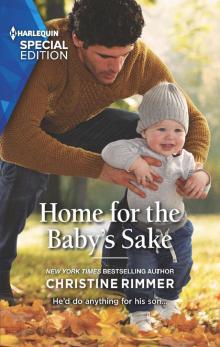 Home for the Baby's Sake
Home for the Baby's Sake In Search 0f The Long-Lost Maverick (Montana Mavericks: What Happened To Beatrix? Book 1)
In Search 0f The Long-Lost Maverick (Montana Mavericks: What Happened To Beatrix? Book 1) A Temporary Christmas Arrangement
A Temporary Christmas Arrangement Switched At Birth
Switched At Birth In Search of the Long-Lost Maverick
In Search of the Long-Lost Maverick From Here to Paternity
From Here to Paternity Almost a Bravo
Almost a Bravo Her Favorite Maverick
Her Favorite Maverick A Husband She Couldn't Forget
A Husband She Couldn't Forget In Bed with the Boss
In Bed with the Boss Bravo Christmas Reunion
Bravo Christmas Reunion The Maverick Fakes a Bride!
The Maverick Fakes a Bride! The Tycoon's Instant Daughter
The Tycoon's Instant Daughter The Bravo Bachelor
The Bravo Bachelor 37 Her Highness and the Bodyguard
37 Her Highness and the Bodyguard A Bravo for Christmas
A Bravo for Christmas THE BRAVO BILLIONAIRE
THE BRAVO BILLIONAIRE The Rancher's Christmas Princess
The Rancher's Christmas Princess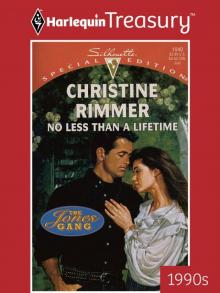 No Less Than a Lifetime
No Less Than a Lifetime A Bravo Christmas Reunion
A Bravo Christmas Reunion Marooned with the Maverick
Marooned with the Maverick Their Secret Summer Family (The Bravos 0f Valentine Bay Book 7)
Their Secret Summer Family (The Bravos 0f Valentine Bay Book 7) Carter Bravo's Christmas Bride
Carter Bravo's Christmas Bride Stroke of Fortune
Stroke of Fortune THE MILLIONAIRE SHE MARRIED
THE MILLIONAIRE SHE MARRIED Marriage, Bravo Style!
Marriage, Bravo Style!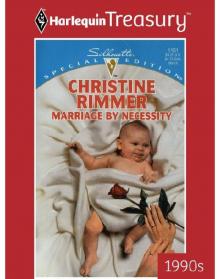 Marriage By Necessity
Marriage By Necessity Marrying Molly
Marrying Molly Married in Haste
Married in Haste A DOCTOR'S VOW
A DOCTOR'S VOW Bravo Unwrapped
Bravo Unwrapped![A Maverick to [Re]Marry Read online](http://i1.bookreadfree.com/i/03/24/a_maverick_to_remarry_preview.jpg) A Maverick to [Re]Marry
A Maverick to [Re]Marry Born Innocent
Born Innocent The Bravo Family Way
The Bravo Family Way The Reluctant Princess
The Reluctant Princess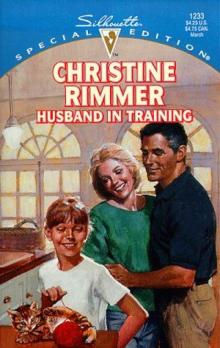 Husband in Training
Husband in Training HOLIDAY ROYALE
HOLIDAY ROYALE James Bravo's Shotgun Bride
James Bravo's Shotgun Bride The Maverick's Accidental Bride (Montana Mavericks: What Happened At The Wedding Book 1) (Contemporary Cowboy Romance)
The Maverick's Accidental Bride (Montana Mavericks: What Happened At The Wedding Book 1) (Contemporary Cowboy Romance) The Stranger and Tessa Jones
The Stranger and Tessa Jones Practically Married
Practically Married The Good Girl's Second Chance (The Bravos Of Justice Creek 2)
The Good Girl's Second Chance (The Bravos Of Justice Creek 2) Married by Accident
Married by Accident Christine Rimmer - A Hero for Sophie Jones
Christine Rimmer - A Hero for Sophie Jones A Bravo Homecoming
A Bravo Homecoming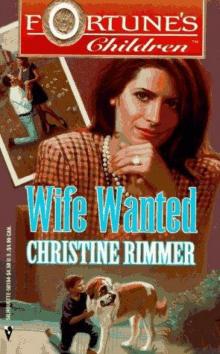 Wife Wanted
Wife Wanted Harlequin Special Edition July 2013 - Bundle 1 of 2: Marooned with the MaverickHer McKnight in Shining ArmorCelebration's Bride
Harlequin Special Edition July 2013 - Bundle 1 of 2: Marooned with the MaverickHer McKnight in Shining ArmorCelebration's Bride Her Favorite Maverick (Montana Mavericks: Six Brides For Six Brother Book 1)
Her Favorite Maverick (Montana Mavericks: Six Brides For Six Brother Book 1) A HOME FOR THE HUNTER
A HOME FOR THE HUNTER![A Maverick to [Re] Marry Read online](http://i1.bookreadfree.com/i1/04/03/a_maverick_to_re_marry_preview.jpg) A Maverick to [Re] Marry
A Maverick to [Re] Marry Lori’s Little Secret
Lori’s Little Secret Stranded with the Groom
Stranded with the Groom Sunshine and the Shadowmaster
Sunshine and the Shadowmaster The Last Single Maverick
The Last Single Maverick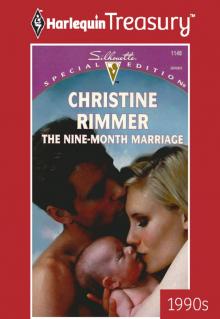 The Nine-Month Marriage
The Nine-Month Marriage Fifty Ways to Say I’m Pregnant
Fifty Ways to Say I’m Pregnant Ms. Bravo and the Boss
Ms. Bravo and the Boss The Marriage Conspiracy
The Marriage Conspiracy Prince and...Future Dad
Prince and...Future Dad Not Quite Married
Not Quite Married The Reluctant Cinderella
The Reluctant Cinderella Their Child?
Their Child? Marriage, Maverick Style!
Marriage, Maverick Style! Donovan's Child
Donovan's Child A Bride for Jericho Bravo
A Bride for Jericho Bravo THE M.D. SHE HAD TO MARRY
THE M.D. SHE HAD TO MARRY DR. DEVASTATING
DR. DEVASTATING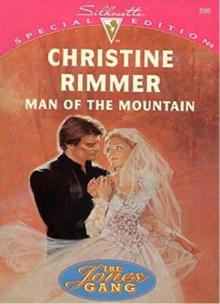 MAN OF THE MOUNTAIN
MAN OF THE MOUNTAIN The Prince's Cinderella Bride
The Prince's Cinderella Bride Rachel's Bundle of Joy
Rachel's Bundle of Joy HOW TO MARRY A PRINCESS
HOW TO MARRY A PRINCESS Prince and Future... Dad?
Prince and Future... Dad? The Prince She Had to Marry
The Prince She Had to Marry Resisting Mr. Tall, Dark & Texan
Resisting Mr. Tall, Dark & Texan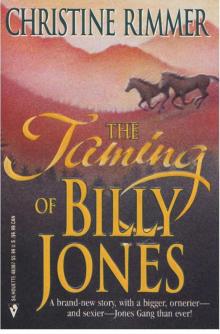 The Taming of Billy Jones
The Taming of Billy Jones McFarlane's Perfect Bride
McFarlane's Perfect Bride The Lawman's Convenient Bride
The Lawman's Convenient Bride The Man, The Moon And The Marriage Vow
The Man, The Moon And The Marriage Vow A Bravo Christmas Wedding
A Bravo Christmas Wedding Scrooge and the Single Girl
Scrooge and the Single Girl Harlequin Special Edition October 2015, Box Set 1 of 2
Harlequin Special Edition October 2015, Box Set 1 of 2 The Marriage Medallion
The Marriage Medallion Cinderella's Big Sky Groom
Cinderella's Big Sky Groom 33 The Return of Bowie Bravo
33 The Return of Bowie Bravo The Prince's Secret Baby
The Prince's Secret Baby WAGERED WOMAN
WAGERED WOMAN